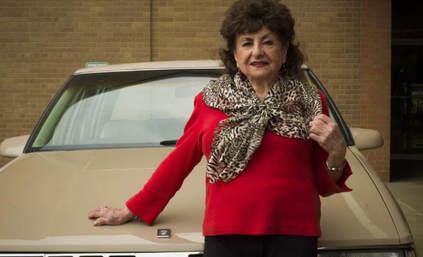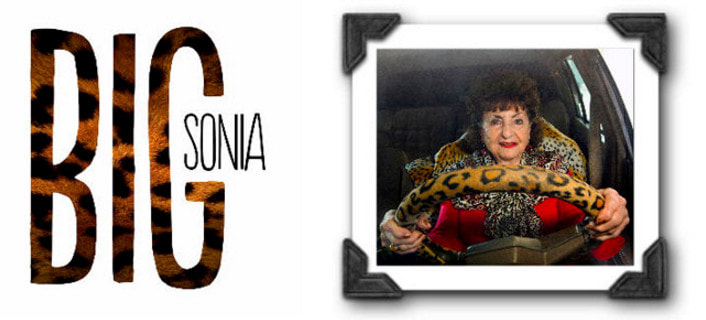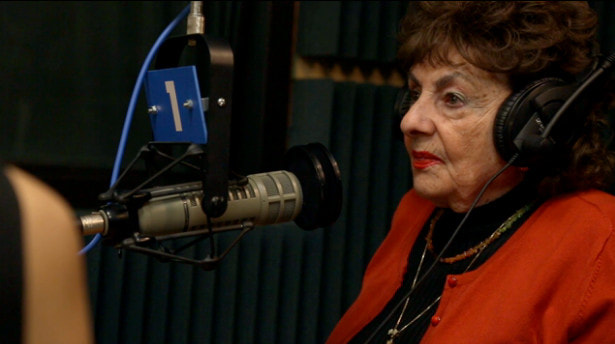
Leah Warshawski’s latest documentary tells a moving family story.
Big Sonia, the latest documentary by Leah Warshawski, follows in the socially aware steps of Finding Hillywood, her award-winning 2013 history of the Rwandan film industry. But the Seattle-based filmmaker’s follow-up takes a personal turn: Warshawski’s subject in this absorbing, moving feature is her paternal grandmother, Sonia, a pint-sized, energetic 90-year-old businesswoman whose beloved tailoring shop faces eviction from its location in a Kansas City mall. Stylish and irascible, Sonia’s also burdened with a harrowing past: As a child she survived the Holocaust while her friends and family perished in the wake of the Nazi atrocities. Big Sonia follows Sonia as she exorcizes those demons and opens the eyes of everyone from high school students to local prison inmates by relating her story to the world.
Big Sonia screens at the 42nd Seattle International Film Festival as a work-in-progress. We talked to Warshawski about bringing the story to the big screen and about her first time co-directing with her spouse, DP and editor Todd Soliday.
When did you first become aware of Sonia’s story?
I went to Hebrew school in St. Louis growing up. I grew up around Holocaust stories, but never really spoke with Sonia about it, and at that time she wasn’t sharing her story in public either, so she was hesitant to talk about her experiences.
I remember seeing the number on her arm for the first time when I was about 12 and I asked my Dad what it meant. I was scared to ask Sonia because I thought it would be too painful. So many other members of my family didn’t survive the Holocaust that it was always a very sad subject to bring up. My father conducted oral history interviews with his family when he was younger and I listed to some of those tapes when I was a teenager. My parents paid me to transcribe some of the interviews, and that was really the first time that I understood the impact on some of my family members.
How long ago did Sonia begin relating her story in public?
About 10 years ago, Sonia heard skinheads denying that the Holocaust happened and decided that she would start speaking in public about what happened to her.
When did you realize her story would make a powerful documentary?
We started filming in 2010. We had initially wanted to make a short film just about her tailor shop and all the interesting characters that come into the shop. But when Sonia got an eviction notice, it provided the arc for a longer film. And then we decided that to do her story justice, we would need to make a feature.
Was it difficult to persuade Sonia to participate in the project?
Well, Sonia has always wanted to be a movie star! [laughs] She’s a natural on camera and she was very patient with us when we asked her to do things over, say things louder or slow down while she was driving. She drives like a bat out of hell!
Your husband, Todd Soliday, has edited, shot and co-directed the film with you. Working with your spouse strikes some as a stressful, even untenable situation. How do you guys manage it?
We actually do different jobs and we’re able to divide and conquer and collaborate when needed. I have so much respect for Todd. His work ethic, his editing style, his camera work…I trust him completely. We both throw ourselves into our work so completely that we have to force ourselves to take sanity breaks a lot. I push him to stay healthy and he encourages me to do the same. It’s a conscious effort all the time.
After watching Big Sonia, it’s hard not to draw parallels between America’s current climate and the conditions that bred the Holocaust.
In some ways, it’s good timing that the film will be seen this year before the elections, so people are reminded of why inclusion is important. It’s really scary that after all she went through, there’s someone in America—who so many people support—that could land us in a similar predicament.
Big Sonia, the latest documentary by Leah Warshawski, follows in the socially aware steps of Finding Hillywood, her award-winning 2013 history of the Rwandan film industry. But the Seattle-based filmmaker’s follow-up takes a personal turn: Warshawski’s subject in this absorbing, moving feature is her paternal grandmother, Sonia, a pint-sized, energetic 90-year-old businesswoman whose beloved tailoring shop faces eviction from its location in a Kansas City mall. Stylish and irascible, Sonia’s also burdened with a harrowing past: As a child she survived the Holocaust while her friends and family perished in the wake of the Nazi atrocities. Big Sonia follows Sonia as she exorcizes those demons and opens the eyes of everyone from high school students to local prison inmates by relating her story to the world.
Big Sonia screens at the 42nd Seattle International Film Festival as a work-in-progress. We talked to Warshawski about bringing the story to the big screen and about her first time co-directing with her spouse, DP and editor Todd Soliday.
When did you first become aware of Sonia’s story?
I went to Hebrew school in St. Louis growing up. I grew up around Holocaust stories, but never really spoke with Sonia about it, and at that time she wasn’t sharing her story in public either, so she was hesitant to talk about her experiences.
I remember seeing the number on her arm for the first time when I was about 12 and I asked my Dad what it meant. I was scared to ask Sonia because I thought it would be too painful. So many other members of my family didn’t survive the Holocaust that it was always a very sad subject to bring up. My father conducted oral history interviews with his family when he was younger and I listed to some of those tapes when I was a teenager. My parents paid me to transcribe some of the interviews, and that was really the first time that I understood the impact on some of my family members.
How long ago did Sonia begin relating her story in public?
About 10 years ago, Sonia heard skinheads denying that the Holocaust happened and decided that she would start speaking in public about what happened to her.
When did you realize her story would make a powerful documentary?
We started filming in 2010. We had initially wanted to make a short film just about her tailor shop and all the interesting characters that come into the shop. But when Sonia got an eviction notice, it provided the arc for a longer film. And then we decided that to do her story justice, we would need to make a feature.
Was it difficult to persuade Sonia to participate in the project?
Well, Sonia has always wanted to be a movie star! [laughs] She’s a natural on camera and she was very patient with us when we asked her to do things over, say things louder or slow down while she was driving. She drives like a bat out of hell!
Your husband, Todd Soliday, has edited, shot and co-directed the film with you. Working with your spouse strikes some as a stressful, even untenable situation. How do you guys manage it?
We actually do different jobs and we’re able to divide and conquer and collaborate when needed. I have so much respect for Todd. His work ethic, his editing style, his camera work…I trust him completely. We both throw ourselves into our work so completely that we have to force ourselves to take sanity breaks a lot. I push him to stay healthy and he encourages me to do the same. It’s a conscious effort all the time.
After watching Big Sonia, it’s hard not to draw parallels between America’s current climate and the conditions that bred the Holocaust.
In some ways, it’s good timing that the film will be seen this year before the elections, so people are reminded of why inclusion is important. It’s really scary that after all she went through, there’s someone in America—who so many people support—that could land us in a similar predicament.
DISCUSSION FOLLOWS EVERY FILM!
$6.00 Members / $10.00 Non-Members
TIVOLI THEATRE
5021 Highland Avenue I Downers Grove, IL
630-968-0219 I www.classiccinemas.com
$6.00 Members / $10.00 Non-Members
TIVOLI THEATRE
5021 Highland Avenue I Downers Grove, IL
630-968-0219 I www.classiccinemas.com







